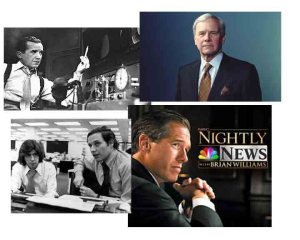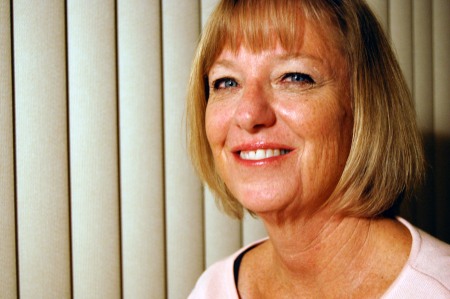That’s the name of my Mom’s last PowerPoint presentation for her JMC110 class (minus the Dylan parentheses). That’s the last hour-and-a-half-long lecture she gave to 125 squirming Freshmen.
I sat in on it because I didn’t know who Ida B. Wells was, and it got me thinking.
That PowerPoint was chok-full of MegaWomen, and students cited their favorites — Christiane Amanpour, Diane Sawyer, Katie Couric, Barbara Walters. And that classroom was absolutely full of young women. (I won’t mention the fact that some of the young men in the class cited Erin Andrews as their favorite woman journalist “because she’s hot” — oops, I mentioned it).
I am in a graduate program in journalism right now that has 19 young women in it, and one guy. One. You know what I have to say about that? The times, they are a-changin’ my friends.
Let’s take a quick look at the newspaperman past: (I’m going to dress up like this for Halloween one year)

Now, a look at the newsman — past (and present):

There’s no way of knowing if this is just us Cronkite…ah…ites who are witnessing first-hand the changing of guards of the journalism profession. And it’s purely anecdotal from my point of view, but things seem to be shifting. All colleges around the US are 60-40 women on average and the trend doesn’t seem to be changing anytime soon. (Anyone know what the classes look like at other j-schools around the country?)
There are two questions that come to mind with this: 1) When did journalism become a woman’s field? and 2) Will we still have to spend most of our lives on morning television before we finally getting the job we’ve always deserved?
And I can make two guesses in answer to those questions: 1) Probably about now, and 2) There likely won’t be morning television jobs to giggle through for the next 20 years.
OK, I thought of three questions: Does this, perhaps, have something to do with the concurrent (and complete) demise of the news industry as we know it? There’s a theory I learned in my Freshman year Sociology class that blew my mind at the time. It said that necessary, subservient, under-appreciated, jobs — teaching, nursing, office management — have become women’s jobs in order to maintain the patriarchal social structure. Or, the social structure forced women into subservient jobs…etc. (Chicken or egg?)
I can’t help but think it at least timely (at best ironic) that more and more women are becoming journalists at a time when all that’s left of the journalism strongholds are a lot of (male) executive editors who watched from their corner offices as innovation was laughed away and the Internet blew up their business model.
And then there are the ones who stood up to the publishers and those who are working now to help the next generation innovate — many of whom are now my professors.
No, in the future, the face of journalism will look probably look more like this:

Oh, and this (the one guy):

Well, I agree with Dylan in this case: Don’t think twice, it’s all right.
(Thanks to Lisa in Phoenix and Grant’s facebook for the photos)





